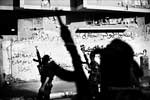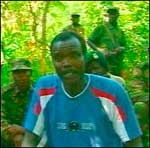June 2006 issue of Crisis Watch, from the International Crisis Group:
Tensions and violence escalated in Israel/Occupied Territories as the Israeli military launched operations into Gaza following the kidnapping of an Israeli soldier by Palestinian militants. In Sudan, implementation of the Darfur Peace Agreement faltered as rebel divisions widened. Insecurity along the border between Chad and Sudan increased as government forces and Chadian rebels renewed fighting. Efforts to resolve the border dispute between Ethiopia and Eritrea were dealt a setback when Eritrea refused to attend a meeting of the International Boundary Commission in The Hague. For North Korea, U.S. intelligence reports suggesting Pyongyang is preparing to test intercontinental ballistic missiles caused widespread alarm. And in Macedonia the campaign for the 5 July general election was marred by violence. The situation also deteriorated in Afghanistan, Ethiopia, Guinea, Morocco, North Caucasus (non-Chechnya), Senegal and Somalia.
Here.
















